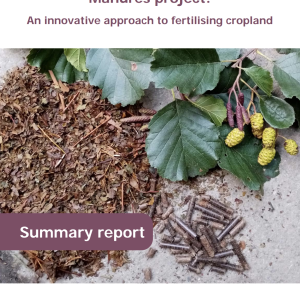
This report by the Perennial Green Manures project shows its experiments with a system of providing nitrogen to crops by use of trees and shrubs grown in 'bioservice areas'. It argues it increases farm resilience by providing shelter and habitats, but also produces nitrogen-rich foliage which is applied to cropland. This could have benefits over fertiliser nitrogen and traditional organic methods in reducing greenhouse gases.
Publisher’s summary
Ecodyfi is working with local farmers and growers to trial a new technique of crop fertilisation. Perennial green manures are fertilisers made from plant material grown in biodiverse areas of coppice woodland and perennial plantings. Much like the fertility-building clovers and vetches long-used by farmers, nitrogen fixing trees and shrubs such as alder trees and gorse bushes work with bacteria in the soil to convert nitrogen into a form useful to plants.
Using this method, farmers will grow their fertiliser in the form of nitrogen-rich tree leaves which are cut when green and added to cropland. These fertiliser-producing areas will be situated on less productive areas of farms such as steep slopes or boggy ground. They will also serve as biodiversity reserves and build up carbon stores in roots and soil. It is hoped that the technique will help farmers meet some of the many challenges they are facing, include fast-rising fertiliser costs alongside the need to increase tree cover for habitat restoration and carbon sequestration.
Initial work at Bangor University has given promising results in scientifically controlled and monitored experiments. These include lower greenhouse gas emissions from soil fertilised with alder leaves compared to that fertilised with manufactured fertilisers and traditional clover green manure. The next step is to trial the technique on crops on working farms. Here in the Dyfi Valley there is a growing trend towards re-establishing the cereal and vegetable growing which has historically been part of our agricultural landscape. Ecodyfi has to recruited some of these local producers to trial perennial green manures in comparison to their usual method of fertilisation.
Plant species which could be used in the trials include nitrogen fixing trees and shrubs such as alder, broom and laburnum, and perennials including alfalfa, lupins and vetches. Other plants which scavenge the ground for nutrients such as comfrey and willow can also be included, as inter-cropping these with nitrogen fixers maximises efficiency.
The project began in summer 2022. Ecodyfi will identify farmers and growers who want to use perennial green manures to fertilise their own crops, and design bespoke trials with them. The trials will began in spring 2023 and the results obtained - including comparative crop yields and testimony of farmer’s experiences - will be made available to other growers. In winter 2023/4 the participating farms will be funded to plant their own perennial green manures for future use. These will be designed and sited for maximum co-benefits to the farm, for example to act as shelter for crops, nectar sources for pollinators, and habitats for birds and insects which control crop pests.
Read more here. See also the TABLE explainer, Nitrogen in the food system







Post a new comment »